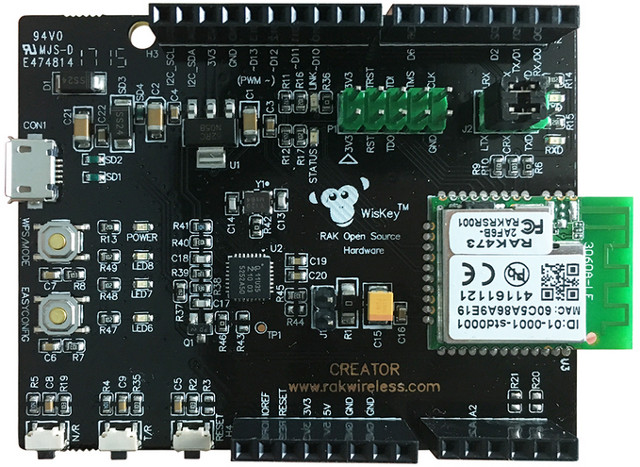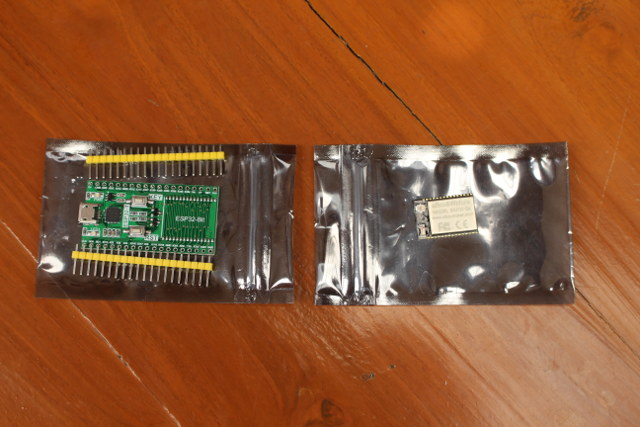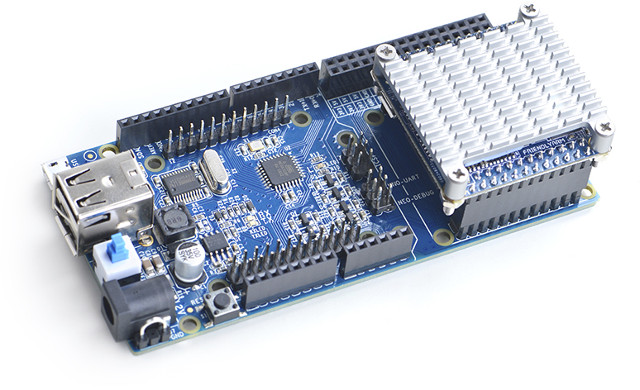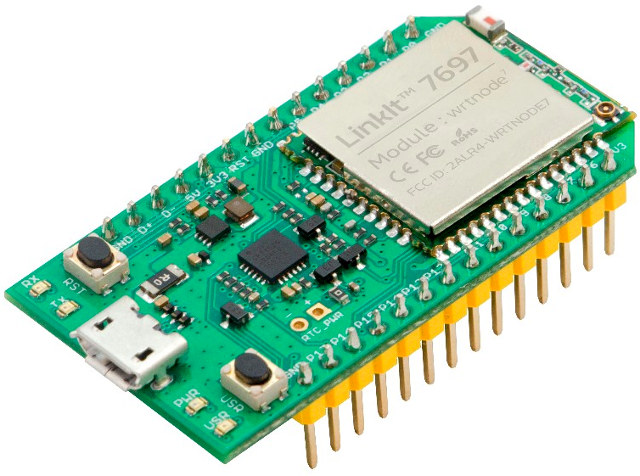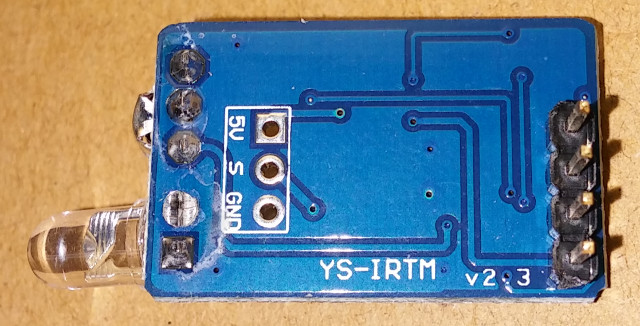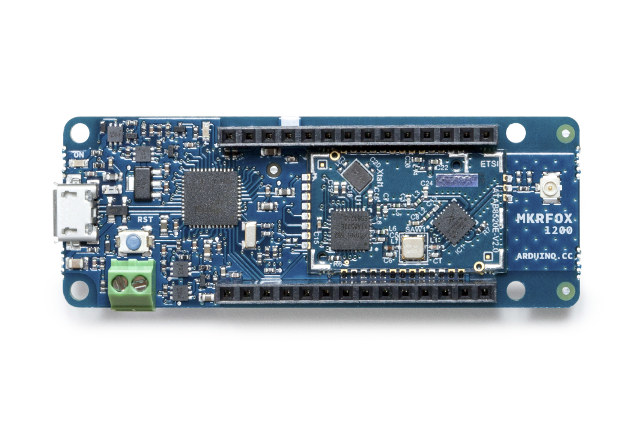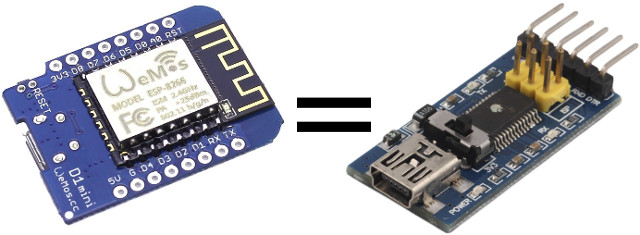Realtek Ameba is a family of WiFi ARM Cortex M3 micro-controllers for IoT applications, and RTL8710AF got some buzz last year, as modules would sell as low as $2, hereby competing with ESP8266 in terms of price. While the solution was interesting, the community activity around the solution has been slow as ESP8266 already have the community and software support. Other Realtek RTL8195AM and RTL8711AM processors offer much more memory, but at the time, price was not as attractive with Ameba Arduino board based on RTL8195AM selling for $25. But there’s now a new Arduino compatible board made by ShenzhenRAK Wireless Technology (RAK) that comes with RTL8711AM processor with 1MB ROM, 2MB SDRAM, 512KB SRAM, and up to 64MB SPI flash, and sells for just $8.80 + shipping on Aliexpress. CREATOR Pro (Wiskey) board specifications: WiFi Module – RAK473 with Realtek RTL8711AM ARM Cortex M3 MCU @ 166 MHz, 1MB […]
Getting Started with ESP32-Bit Module and ESP32-T Development Board using Arduino core for ESP32
Espressif ESP32 may have launched last year, but prices have only dropped to attractive levels very recently, and Espressif has recently released released ESP-IDF 2.0 SDK with various improvements, so the platform has become much more interesting than just a few weeks ago. ICStation also sent me ESP32-T development board with ESP32-bit module, so I’ll first see what I got, before trying out Arduino for ESP32 on the board. ESP32-T development board with ESP-bit Module – Unboxing & Soldering One thing I missed when I asked for the board is that it was not soldered, and it comes in kit with ESP32-bit module in one package, and ESP32-T breakout board with headers in another package. The 21.5x15mm module is based on ESP32-DOWNQ6 processor with 32 Mbit (4MB) of flash, a chip antenna, and a u.FL connector. The module is apparently made by eBox, and also used in Widora board with […]
NanoPi NEO Boards Get a New Arduino UNO Compatible Dock to Play with Arduino Shields
FriendlyELEC has launched a new accessory board for their NanoPi NEO / NEO 2 / NEO Air boards with UNO Dock V2.0 board compatible with Arduino UNO board thanks to its Microchip ATMeaga328P MCU and compatible headers, and also equipped with headers to plug a NanoPi NEO board. Key features for UNO Dock v2.0 for NanoPi NEO: MCU – Microchip ATmega328 8-bit AVR MCU @ 16 MHz with 2KB SRAM, 32KB flash, 1024 bytes EEPROM USB – 2x USB 2.0 ports connected to NEO board Expansion Arduino UNO headers for shields Female headers to insert the NanoPi NEO board Male headers to access NanoPi NEO boards’ IOs Debugging & Programming – 1x micro USB port (USB to UART), ICSP header, NEO debug UART header Misc – Power on/off, reset button, UART select jumper Power Supply – 12V DC via 2.1mm power barrel The system would be great if NanoPi […]
$14 LinkIt 7697 Bluetooth 4.2 LE and WiFi IoT Board is Powered by Mediatek MT7697 ARM Cortex-M4 MCU
Mediatek Labs has launched a new IoT development, which on the surface looks similar to LinkIt Smart 7688 board, but the internal design is quite different as the MIPS processor and Linux OS, have been replaced by Mediatek MT7697 ARM Cortex-M4 processor running FreeRTOS, and beside WiFi, also includes support for Bluetooth 4.2 LE. LinkIt 7697 board specifications: Wireless SoC – Mediatek MT7697 ARM Cortex M4F MCU @ 192 MHz with 352KB RAM, 4MB flash, 802.11 b/g/n WiFi, Bluetooth 4.2 LE and a PMU Expansion – 2x 14-pin header with 18x GPIO, 2x UART, 1x I2C, 1x SPI, 18x PWM, 4x EINT, 4x ADC (0 to 2.5V), 1x IrDA, 1x I2S Debugging – 1x SWD, CP2102 UART to USB chipset Misc – Reset and user buttons; power and user LEDs Power Supply – 5V via micro USB port Dimensions – 48 x 26 mm The board can be programmed with […]
Wio GPS is a $40 Grove & Arduino Compatible Bluetooth 3.0 + GSM/GPRS + GPS Tracker Board
After Wio Link and Wio Node boards, Seeed Studio has added a new board to their Wio (Wireless Input Output) family with Wio GPS board based on Microchip SAMD21 Cortex M0+ MCU for Arduino compatibility, and Mediatek MT2503 ARM7 processor for GPS, Bluetooth 3.0, and 2G (GPRS) connectivity. Wio GPS board specifications: MCU – Microchip ATSAMD21G18A-MU ARM Cortex M0+ MCU @ 48 MHz with 256KB flash, 32KB SRAM Wireless SoC – Mediatek MT2503 ARM7EJ-S processor @ 260 MHz Storage – micro SD slot (shared with nano SIM slot) Connectivity (built-in MT2503 in Quectel MC20 module) Bluetooth 2.1 + EDR, 3.0 with SPP Profile and HFP-AG Profile; u.FL connector for external antenna Quad band 2G GSM/GPRS with u.FL connector for external antenna and nano SIM card slot GNSS – GPS + BeiDou + QZSS with u.FL connector for external antenna Audio – Speaker footprint (+/-), 3.5mm AUX jack with mic and stereo audio […]
Karl’s Home Automation Project – Part 4: MQTT Bridge Updated to Use YS-IRTM IR Receiver & Transmitter with NodeMCU
In a previous article, I wrote about an MQTT bridge by 1technophile. I added a DHT temperature and humidity sensor as well as a light sensor. Previously it included a software decoder to decode the IR signal. I never did test the IR transmitter on the gateway, as I didn’t have the parts. But thanks to IC Station, who sent me over a small YS-IRTM hardware based decoder and NodeMCU that I am writing about today. I have replaced the software based version with the YS-IRTM module in the latest update. I found this project challenging. I admit I am a little weak in my programming skills. It was difficult to find documentation but I found a forum talking about this device and basics of how it works. When an IR code is recognized it sends 3 hex codes via serial connection on the transmit pin. To transmit, it expects […]
Arduino MKRFOX1200 Board Combines Microchip SAM D21 MCU with Sigfox Module in MKRZero Form Factor
Arduino MKRFOX1200 is the first official Arduino board to feature LPWAN technology thanks to a Microchip ATA8520 Sigfox module combined with a Microchip SAMD21 ARM Cortex M0+ micro-controller, all that in the same form factor as MKRZero or MKR1000 boards. Arduino MKRFOX1200 specifications: MCU – Microchip SAMD21 ARM Cortex-M0+ MCU @ 48 MHz with 256KB flash, 32KB SRAM Connectivity – Microchip AT8520 Sigfox module operating @ 868 MHz with 2dB “GSM” antenna connected to u.FL connector 2x 14-pin headers for I/Os: 8x digital I/O 8x external interrupts (0, 1, 4, 5, 6, 7, 8, A1 -or 16-, A2 – or 17) 7x analog inputs (8/10/12-bit ADC) 1x analog out (10-bit DAC) 12x PWM pins ((0, 1, 2, 3, 4, 5, 6, 7, 8, 10, A3 – or 18 -, A4 -or 19) 1x UART, 1x SPI, 1x I2C 3.3V operating voltage DC Current per I/O Pin 7 mA USB – […]
Transform Your ESP8266 Board into a USB to Serial Board Easily with Arduino Serial Bypass Sketch
USB to serial boards are necessary to program and debug boards, and/or access the serial console, and while they are very cheap, you may be in a situation where you don’t have any around, but you do have some Arduino compatible boards. It’s been possible to transform an Arduino board into a USB to TTL debug for several years using ArduinoSerialBypass.ino sketch, but I’ve been informed this also works on ESP8266 boards such as Wemos D1 Mini. The sketch could not be simpler:
|
1 2 3 4 5 6 7 8 9 |
void setup() { pinMode(0,INPUT); pinMode(1,INPUT); } void loop() { } |
The code simply makes sure that Tx and Rx pins are set as inputs in order not to disturb the serial connection as explained below: This code makes the Arduino not interfere with pins 0 and 1 which are connected to RX and TX on the FTDI chip. This allows the data coming from the FTDI USB 2 Serial chip to flow directly to another device. […]


